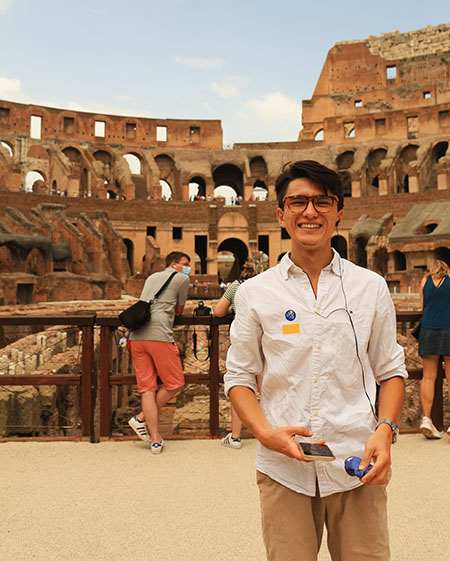Campus News
Life Beyond the Redwoods: Maxwell Ward follows his dreams one year after UCSC graduation
One year after graduating from UCSC, Maxwell Ward (Cowell ’22, history of art and visual culture and anthropology) is pursuing a Ph.D. in anthropology with a focus on archaeology from McGill University in Quebec and is an editor at Collective Research in Anthropology Journal.

Maxwell Ward wanted to be an archaeologist since he was six years old.
Now, about a year after graduating from UC Santa Cruz, his dreams have come to fruition.
Ward is pursuing a Ph.D. in anthropology with a focus on archaeology from McGill University in Quebec and is an editor at Collective Research in Anthropology Journal. His primary focus lies in the Andes. He is particularly interested in how groups conquered by the Inka used their experiences with that group to inform their responses to Spanish colonization.
“While not a particularly novel interest, without the contemporary documentary evidence that archaeologists working in classically lauded areas like Greece or Egypt have, there is much to be done and many gaps in existing research,” explains Ward.
Ward began his Ph.D. in 2023 and is ecstatic at the opportunity to teach others about the field he is passionate about. He is grateful to have already gotten a glimpse of that experience in the summer of 2022.
Immediately after graduating from UCSC, Ward traveled to Ecuador to work as a crew chief for the Arqueologico Projecto Zuleta and Zuleta Field School. There, he documented and analyzed artifacts and trained Ecuadorian undergraduate students in lithic and ceramic analysis. Ward oversaw five students excavating a 3x2m unit and ensured the well-being of all students affiliated with the project.
Ward also worked as a lab assistant at the Cochasquí archaeological project, where he analyzed and documented over 1,000 artifacts collected from the project. When he returned from Ecuador, Ward worked as a course assistant at UC Santa Cruz, leading four sections of up to 15 students each.
“I love teaching, and archaeology is a particularly special science because it is almost only pursued by those with a genuine love for the discipline,” Ward says. “That made my jobs easy but all the more fruitful. I liked to think the students I was teaching in each of these positions loved hearing about archaeology, and I definitely loved talking to them about it.”
Ward’s main aspiration is to make the archaeology field more accessible to people around the world.
“Through methodologies such as community-based archaeology, participatory research, and citizen science, I believe that the discipline can be opened up in a way that it never was before—to the diverse and undeniably important perspectives of those so long excluded from the discipline.”
Setting the groundwork at UCSC
While at UC Santa Cruz, Ward pursued two opportunities that changed the course of his career. He worked as an officer in the Integrated Anthropology Association (IAA) and spent a quarter in Washington, D.C., as part of the UCDC program.
As part of the IAA, Ward says he sharpened his lecturing skills by developing short, discussion-based lectures geared toward exposing the varied aspects of anthropology to club members, and he developed close relationships with his peers.
“The members of the club were among some of the most driven and intelligent people I have ever met, and I think they will continue to be a part of my network well into the future,” he says.
While in Washington, D.C., Ward interned at one of the most famous museums in the world:
“I interned at the Smithsonian. THE SMITHSONIAN. If I had told the child me I had this experience waiting for me, I would’ve passed out on the spot. In all seriousness, it was an extremely important experience.”
“I mark that experience as the beginning of my career,” Ward says. “Having a big name like the Smithsonian on my résumé, in addition to the connections I made, defined my senior year, and in a workaround way, was the reason I attended an archaeological conference later that same year, where I met my current Ph.D. advisor.”
Ward says he is grateful to his parents, who have supported his dreams since childhood, and to UCSC for bringing those dreams to reality.
“I wanted to be an archaeologist since I was six,” says Ward, “but I didn’t understand what being an archaeologist meant until my first year at UC Santa Cruz.”